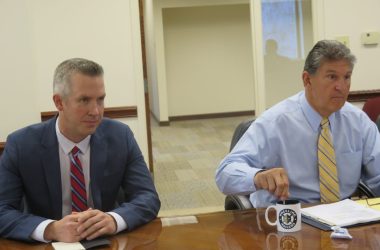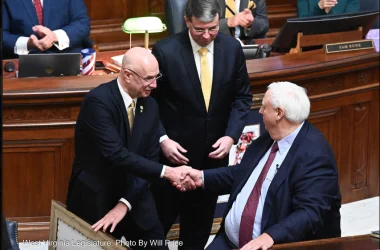By PHIL KABLER
Charleston Gazette-Mail
CHARLESTON, W.Va. — State Election Commissioners voted Wednesday to put up $4,000 — or 80 percent of the commission’s annual budget — to help promote a new voter identification program the Secretary of State’s Office is launching.
The money will go to buy fliers to promote a voter ID card that the Secretary of State will offer to registered voters who otherwise don’t have forms of identification that they will be required to show in order to vote, under a new state law that goes into effect on Jan. 1.
“We need to get word out to the public that you need an ID to vote, and if you don’t have one, you can go to your county clerk’s office and apply for one,” Elections Director Donald Kersey said of the new program.
Under the program, residents without IDs who are registered to vote — Kersey said statistics show that about 5 percent of state residents don’t have driver’s licenses — will be able to go to their county clerk’s offices and fill out an application to receive a state Voter Identification Card.
Kersey said the office will provide each clerk with digital cameras, costing about $30 to $50 each, and said the Secretary of State’s office will be using equipment and software it currently uses to produce employee ID badges to produce the PVC plastic cards.
“I like it,” said Gary Collias, the commission’s chairman. “I’m not sure it’s exactly what the Legislature had in mind, that you can get this ID without having an ID.”
In 2016, the Legislature took what sponsors called a proactive step to crack down on potential voter fraud by requiring voters to provide proof of identification at the polls — even though no one could provide any substantive evidence of instances of in-person voter fraud in past elections.
Acknowledging that courts have struck down voter ID laws in other states, legislators included a broad variety of identification that would qualify under the new law, ranging from driver’s licenses and passports to concealed carry permits and bank cards.
Kersey said the fliers will be part of a multimedia promotional campaign by Secretary of State Mac Warner’s office to reach registered voters who lack ID, including people in nursing homes and homeless shelters.
“Radio and TV is where we can really target our illiterate voters,” he said, responding to a question from commissioner Taylor Downs regarding the effectiveness of fliers for voters who can’t read.
Collias said he considers the $4,000 allocation a good use of the commission’s limited budget.
“It doesn’t do any good to have this program if no one knows about it,” he said.
Also Wednesday, commissioners turned down a request from Monongalia County to activate technology on their precinct-level electronic vote tabulators that would allow unofficial election results to be sent, via encrypted data transmission, directly to the clerk’s office after the polls are closed.
Monongalia County Clerk Carye Blaney said that would provide several advantages, including much faster tabulation of results on election night, since the thumb drives with the election results would not have to be delivered from each precinct to the clerk’s office on election night.
Cam Wilson, account manager for Election Systems Software, told commissioners that nine states, including all but two counties in Florida, use the technology. He said it allows them to post final unofficial countywide election results within 45 minutes after the polls close.
Blaney said it is also a safety issue, since poll workers would not have to drive as long as 45 minutes to Morgantown to deliver the thumb drives, after having worked the polls for 15 hours.
Commissioners, however, raised doubts about whether the software to allow the results to be transmitted to the central office would be considered a separate electronic voting system under state election law — which would require multiple levels of state and federal certification before it could be used.
They conceded that state laws regarding electronic voting systems — all written 10 to 12 years ago — are inconsistent, and probably didn’t anticipate the technology in question.
Kersey called on commissioners to err on the side of caution, saying that if “something nefarious” happened with the electronically transmitted election returns, Warner “is going to be the one in front of Congress saying, ‘We approved this, despite what state law said.’”
Collias suggested that Blaney should pursue legislation to clarify that the faster system would simply modify an already approved electronic voting system, or to seek a court order directing the commission to approve the system.
“I think these systems are the future, but right now, I think the law, at the least, is unclear,” he said.
See more from the Charleston Gazette-Mail




